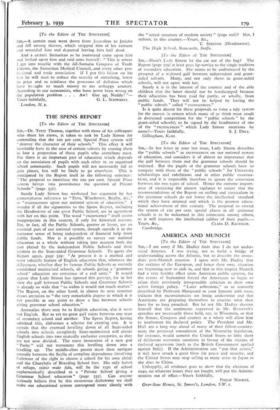AMERICA AND MUNICH
[To the Editor of THE SPECTATOR] SIR,—I am sorry if Mr. Hadley finds that I do not under- stand America. I was trying, not to build a bridge of understanding across the Atlantic, but to describe the imme- diate post-Munich reaction. I agree with Mr. Hadley that the realities of the European, and hence their own, situation are beginning now to sink in, and that in this respect Munich had a very healthy effect upon American public opinion, for the events of September forced the Americans to begin to relate their previously irresponsible criticism to their own active foreign policy. " Later reflections," as so correctly described by Professor Marquand in your January loth issue, indicate that inconsistencies are being understood and that Americans are preparing themselves to practise what they have for so long preached. But let not Mr. Hadley deceive himself that the sentiments expressed in Mr. Roosevelt's speeches are necessarily those held, say, in Wisconsin, or that the Senate, Congress and country as a whole will allow him to implement his declared policy. The President and Mr. Hull are a long way ahead of many of their fellow-country- men; the proposed amendment of the Neutrality legislation, for instance, would commit the United States to little short of deliberate economic sanctions in favour of the victims of declared aggression (such as the British Government applied against Italy). If the Administration can " put that across," it will have struck a great blow for peace and security, and the United States may stop selling as many arms to Japan as she does to China.
Unhappily, all evidence goes to show that the elections of 1940, on whatever issues they are fought, will put the Admini- stration out of office.—Yours faithfully,
PHILIP NOAKES.
Over-Seas House, St. 7ames's, London, S.W. r.










































 Previous page
Previous page